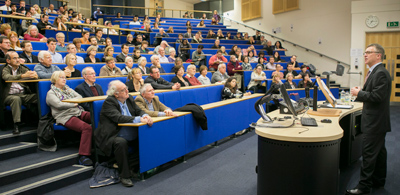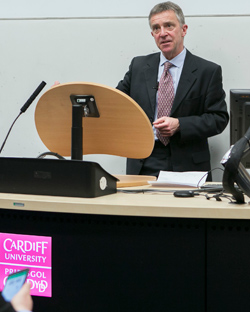There is no black and white – Seeking the perspective of others
Posted by: Arabella Munro
Nick Lewis Memorial Trust Lecture: Given by John McCarthy
There is no black and white – Seeking the perspective of others.

The subtle theme woven through John McCarthy’s talk last night was of empathy and understanding. Firstly of understanding what it was like to live in a country where fighting was usually a daily reality. Then, gradually over three months in solitary confinement, a deeper understanding of himself.
He described his first view, as he tentatively removed his blindfold, of Brian Keenan: wild haired and even wilder eyed. They forged a special bond over the next four years that required, more than anything, giving each other what they lacked in every other way: their own space.
There were only five human faces McCarthy could look freely into during his five years of captivity. These were those of the other captives. This was because they had to wear their blindfolds at all times, hurriedly pulling them down whenever a guard came into the room.
 Illustrative of the insight he shows about surviving captivity, McCarthy described his guards as “hiding behind our blindfolds” – a particularly powerful description of the relationship their enforced blindness created. However, he stressed that for the most part his humanity was not taken away from him. Bar two or three particularly awful men – and despite growing up in the utter chaos of civil war – these people, he emphasises, were not monsters.
Illustrative of the insight he shows about surviving captivity, McCarthy described his guards as “hiding behind our blindfolds” – a particularly powerful description of the relationship their enforced blindness created. However, he stressed that for the most part his humanity was not taken away from him. Bar two or three particularly awful men – and despite growing up in the utter chaos of civil war – these people, he emphasises, were not monsters.
It is this last point that is particularly relevant now. In a brief interview before the talk I asked John how his experience informed his opinion on current hostage situations in Iraq and Syria. He emphasised that it was a different world, that as awful and terrifying and frustrating as his own experience had been, he could not imagine what it must be like to be held under the constant threat of a brutal and gruesome public execution used for propaganda purposes.
He maintains, however, that it is crucial to forge bonds of understanding – that we must have people on the ground, and that we have as few journalistic ‘voids’ as possible where terrible things are being done but the press cannot access although he did also say he would not go to Iraq or Syria himself at the moment because “it is just too dangerous”. Nor, indeed, would he encourage any young journalists or students to go just yet. After all, it was on his own first visit to the Middle East, as an unknown producer learning the ropes, that he was taken.
It was a real privilege to meet John McCarthy, so, on behalf of all the CJS attendees, thank you to the Nick Lewis Memorial Trust for inviting us.
